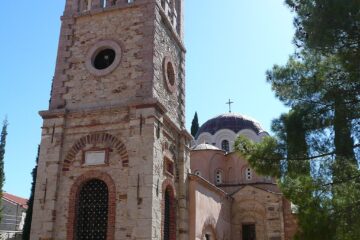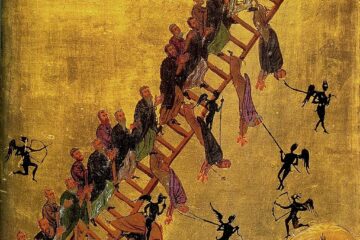The following in an excerpt from “Eros of Orthodoxy,” translated by Fr. Nicholas Palis and written by Mr. Pantelis Paschou.
In the books of our Church, the Dormition of the Theotokos, which is celebrated on the 15th of August, is noted with these words: “On the 15th of this month, we commemorate the All honorable translation of our all-glorious Lady Theotokos and ever-virgin Mary.”
When Christ wished to call His All-holy Mother near Him, He revealed His will to her three days prior to the Dormition, sending the Archangel Gabriel. The Archangel descended giving her a palm branch and announced to her, her divine Translation from earth to Heaven, from the temporary life to the immortal one. Hearing this angelic saying the Panaghia rejoiced and with haste went up to the Mount of Olives to pray and thank God. After the Panaghia had remained there a long time and prayed, she returned to her house and upon entering felt as if an earthquake shook it. She lit many lights and invited her women relatives and neighbors. She cleaned and put everything in order, even her deathbed, and she revealed the words of God that the Archangel brought her.
At that time a thundering was heard and many clouds covered the Panaghia’s house. And one by one the Holy apostles started descending, coming from the ends of the Earth. The Panaghia said farewell to them all, then with zealous petitions and supplications she prayed to her Son and God, for the peace of the world and the strengthening of the Apostles, and then lied down on the deathbed which she herself had prepared earlier. She blessed the Apostles and gave up her all-holy soul to the hands of her Son, who descended to receive her.
After they chanted the burial encomiums to her the Apostles then lifted the deathbed and with torches and funerary Hymns, went to bury the God-receiving body of the Godmother at Gethsemane. When the Apostles reached Gethsemane, they buried the most venerable relic of the Theotokos with many honors and remained there for three days. By divine providence, one of the holy Apostles was absent from the burial and arrived on the third day. Then they opened the tomb so that the delayed Apostle could venerate the body of the Theotokos. But in amazement and wonder all of them saw an empty tomb! The Apostles knelt and venerated the empty tomb of the Panaghia who had been “translated” and had ascended to Heaven.
Orthodox theology having the bright guide of holiness and truth behind it and the tradition of the God-bearing Fathers, can’t respond with a “no” to the miracle of the Translation of the Panaghia. This miracle is comparable in greatness to the Ascension of Christ.
There are many patristic and hymnographical blossoms, concerning the divine Translation of the Panaghia, because the Saints, love the person of the Panaghia greatly. People honor the Panaghia and her Dormition all over the world. The deeply believing Christian bows on that day, sees her empty tomb, is informed about the divine Translation and perceives the depth of divine judgments, the hope of his own translation as well. This is the reason that the commemoration of the Dormition “isn’t sad and mournful,” but joyous and gladsome.
In order to be genuine, the feast’s joy, must spring forth from a conscience with good deeds. The feasts which occur in honor of Saints and in particular the Panaghia, shouldn’t happen “in a worldly and pleasure loving” manner, but “divinely and spiritually.” Our honor of the Panaghia on the day of her commemoration must take place with the necessary purity of soul and body but also with charity to the poor.



0 Comments